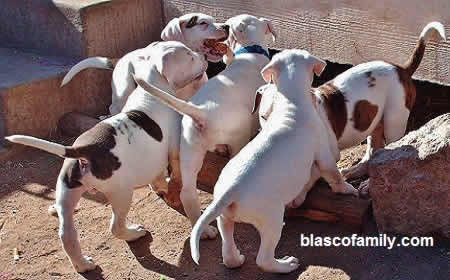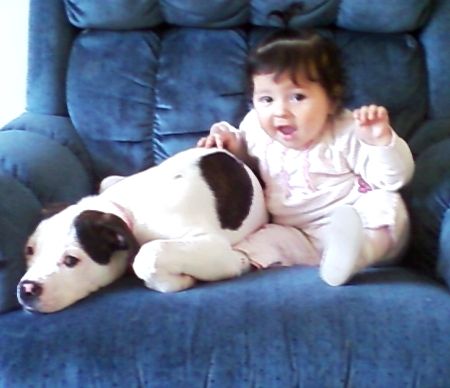 Nature
and Nurture
Nature
and Nurture
This Daewoo Bobcat is a big, very loud, smelly,
monster of a machine that these one month old puppies were completely
unfamiliar with. We loaded them up and roared up and down the driveway.
Nobody screamed in fear. Nobody tried to escape or even looked particularly
nervous. That says a great deal about the nature of these puppies.
They are naturally calm, confident and not easily frightened. However,
the act of doing it was a nurturing exercise, teaching them
to not be afraid if their people are involved - thus reinforcing their
natural confidence obtained through good breeding (nature), with
specific teaching exercises designed to further build that confidence
(nurture).
Dog temperament is based on a combination of
nature and nurture, not simply nature. What this means is that
your dog's pedigree - who its parents and grand parents are, its "champion
bloodline" - these have a lot less to do with your dog's temperament
than how it was raised. This is why here at Blasco Family Bulldogs©
we keep our litters together until 10 to 12 weeks of age, nurturing
good temperament. This is part of my job as a conscientious professional
breeder of dogs, to give a new owner a dog that has had a good head
start.
 Example
Training Techniques
Example
Training Techniques
Blasco puppies typically experience things like
being placed in very cold water, just slightly too warm water, fast
and rough off-road driving in my truck, being "abandoned"
on large, steep hills they can't see over, being placed on tables
(or wine kegs) they can't jump from, vacuum cleaners roaring across
the carpet at them, as well as gun fire and strings of fire crackers.
These are all things to help them become familiar, not necessarily
with the particular thing that they're being exposed to, but familiar
with frustration and stress.
A Simple Philosophy
Our goal here is to teach puppies via associative
training methods the pointlessness of fear, i.e., every time
they may feel a little fear, it turns out just fine and courage
is accompanied with praise and followed by a good lunch. As an associative
training technique, this teaches a dog to welcome stress and frustration,
and recognize difficulties as a means to an end: Praise, reward,
good food.
It also allows that an older dog, having experienced
such things, is neither easily frustrated or stressed, thus promoting
the better personality stability of the adult dog.
I like to try and expose my litters to as many potentially
intimidating experiences as possible. I don't mean scaring them,
no way and not ever! Anything we do is accompanied by lots of softly
spoken encouragement, petting and stroking, allowing the puppies to
know that we're there with them, that everything is okay.
Also, any puppy on my own yards that becomes noticeably
frightened during such an exercise, is immediately removed from the
exercise, given comfort, special attention and further testing in
the coming weeks, and if not meeting my standards for good early temperament,
that puppy may well be euthanized.
Breeder Responsibilities Regarding Dog & Puppy
Temperament
That also is a responsibility of a professional
breeder of dogs, certainly not an attractive responsibility, but
of utmost importance. As professional breeders it is up to us,
to simply not allow dogs with known poor temperament issues, to ever
reach the general public. You can sterilize a dog with a health
issue, inform the prospective owner of the problem, and allow that dog
to go on and enjoy its life, but no good breeder releases a dog to a
new owner, knowing the animal is unusually fearful or timid. That's
a recipe for adding to dog bite statistics, and no dog's life is
worth the fingers, hands or face of a child.
Right up there with the importance of the physical
health of a puppy, is temperament. While not all poor temperament
issues in a dog are fear related, most are. So, we seek to teach
the lesson early, that there is nothing to fear. In this way,
later in a dog's life, or very soon when it's rehomed, our dogs
tend to be strong minded, fearless little beasts, not apt to allow anything
that does cause them a measure of fear, to motivate stress related behaviors,
such as timidity, or worse, undo stress related aggression.
People tend to believe that the earlier they get
their puppy the better they'll bond with it. That's just not
true. Another part of what your puppy is learning through extended
time with mom and littermates is HOW to bond. Get your dog too early
and it has missed one of the most important phases of canine development
it will ever have a chance at.
One of the primary reasons we have a significant dog
biting problem in the United States, apart from the typically associated
owner irresponsibility, is that it is common place here in the states
to break litters apart at eight and even as young as six weeks of age,
long before they've learned the emotional stability and confidence of
a properly pack-raised dog.
Work With Nature to Develop Better Socialization
& Temperament Training
I'm talking directly to a lot of fellow breeders here,
and sadly, most AKC breeders, regarding ALL breeds of dogs...
You need to improve your whelping process, focus more on psychological
development, and start a new fad within the dog breeding industry,
inclusive of proper pack whelping, repeated temperament testing and
training, and lengths of time always exceeding nine weeks for
early puppy socialization among mom and siblings.
If you're rehoming puppies as young as 6-weeks of
age, you don't have a clue what you're actually sending out the door,
and you're robbing your dogs (as well as their prospective owners)
of the early pack socialization all dogs need, and that nature provides
for.
Furthermore, your dogs' star spangled, gold foiled
pedigrees have no bearing whatsoever on this topic. Regardless
of who the dad, mom and grandparents are, dogs are individuals,
each needing to be properly evaluated as unique individuals, each needing
to have stable personality cultivated, tested and not simply
presumed.
While we're on the topic, I'll also tell you that I
highly recommend the Bio-Sensor "Super Dog" Program for early
neurological stimulation, and I like to expose puppies to lots of textures,
sounds, and perception aids, such as mirrors and transparent tables.
However, in my opinion what is of greatest importance, is bite inhibition.
 Bite
Inhibition and Extended Pack Whelping Teaches Self-Control...
Bite
Inhibition and Extended Pack Whelping Teaches Self-Control...
Consider these nine week old American Bulldog
puppies playing together... That's the best training your dog is
ever going to get not to bite someone in an unwarranted fashion or be
too rough in play.
Dogs learn bite inhibition and other important
social skills as puppies. The way it works is this...
Puppy 'A' is feeling a little rambunctious and
starts gnawing on the neck of puppy 'B'. Now as long as puppy 'A' doesn't
gnaw too hard, all is well, there's no significant complaints, and they'll
play together nicely. However, in this case puppy 'B' starts crying
loudly, cause puppy 'A' is really digging in with those needle sharp
puppy teeth. If puppy 'A' has begun learning bite inhibition, that crying
alerts him to the fact that he's gnawing too hard and he alters the
behavior. However, if puppy 'A' doesn't stop, all the
rest of the puppies will become quickly agitated and very likely jump
on the offender, TRAINING puppy 'A' to be more polite, and not cause
pain with his mouth.
Mom may also get involved with a more hardheaded
little brute who likes to bully his or her siblings too rough, teaching
a young dog through nips, bites and threats to be more gentle.
As a breeder with a litter of puppies at my feet,
I'll do similarly.
This is a process that takes place in a pack
of puppies, all teaching one another not to be overly rough, to use
restraint with their mouths, to not bite too hard.
A puppy must have a minimum of 10-weeks with its
siblings with simultaneous proactive people and animal socialization
exercises to be sure of actually learning to be a good, well balanced
dog when it comes home. At Blasco Family Bulldogs©,
we prefer 12-weeks and depending upon what we see in a litter's psychological
development, maybe 10-weeks, but never sooner.
 And
this is why it matters...
And
this is why it matters...
The puppy you take home is expected
to know how to control an urge to bite someone small who hurts it, and
to not be fearful and unstable. Dogs learn much of that from other dogs
as puppies - assuming they're allowed to be puppies with other puppies
for a little while.
If you're buying a dog, understand
that it matters. Seek breeders who keep litters together at least
nine weeks but preferably 10 to 12 weeks. An eight week old dog may
legally be rehomed, however, it is definitely not ready to be rehomed,
no matter how many reputable breeders do it. This is a widespread
knowledge deficit across the dog breeding industry. Wait and allow your
purchasing power to incentivize positive change within the dog breeding
industry. Just don't purchase puppies that are too young. Tell your
breeder that you want your puppy to remain with its mother and littermates
longer.
Rehoming puppies at 10 to 12
weeks of age accomplishes bite inhibition thus lowering the likelihood
of unwarranted dog bites. It teaches a puppy confidence in dealing with
the commonalties of life. It improves how well puppies bond with new
owners. If purposeful people and animal socialization is taking place
it assures a far more socialized young dog. Ultimately it's just the
best thing for the dogs, for you the new owner, for your kids and for
the reputation of the dog breeder who is able to provide a better, stronger
minded, more stable puppy to new owners.





